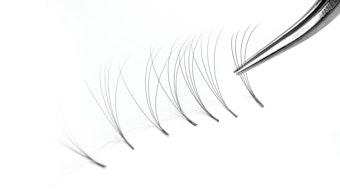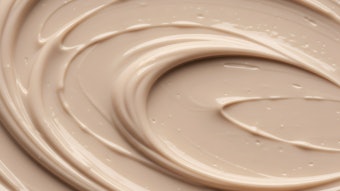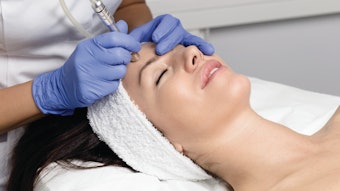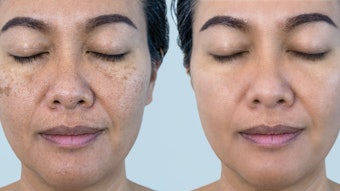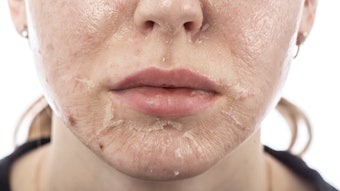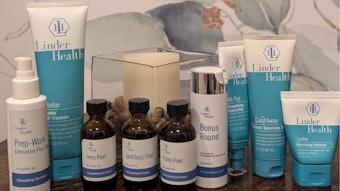
Most people will suffer from some sort of skin sensitivity—either long-term or short-term—at some point throughout their life. Several factors or combinations of factors may cause skin sensitivities and reactions, including aging, hormones, ingredient allergies, illnesses, medications and environmental conditions.
Sensitive skin is less of a skin type and more of a condition, resulting in signs of inflammation, reactivity to touch, dryness, and the appearance of rashes, papules or pustules. Some clients truly have sensitive skin, while others have sensitized their skin through environmental factors, or overexposure of products and treatments.
Aging
The changes that often accompany the aging process include dryness, wrinkle development, loss of elasticity, appearance of veins and thinning of the skin. Most aging skin is vulnerable to sensitivities because of the aggressive treatments and products that were used when the skin was younger.
To prevent aggravating sensitive aging skin, treatments should be gentler, in order to avoid causing inflammation and rashes. Because the skin is thinner and tends to absorb liquids quickly, enzymes should be used instead of liquid peel products in order to avoid possible adverse reactions because they penetrate at a slower pace.
Products that contain a less aggressive level of potency of anti-aging ingredients should be chosen for sensitive skin. Hydration is also key: Ingredients such as hyaluronic acid, ceramides, waxes and butters are beneficial. Rather than using products containing retinol, look to those with retinaldehyde, which is gentler on the skin, but still highly effective.
Health-challenged skin
Health-challenged skin occurs when the skin is affected by medical diseases, medications and treatments. Diabetes, cancer and lupus are just a few of the diseases on the rise in the United States, and the treatments and prescriptions used to control them can have severe side effects on the skin.
Most people diagnosed with a medical illness will, at some point in treatment, develop sensitivities. Diabetics deal with rashes, glycated skin, easily infected areas and even neuropathy, a result of nerve damage that can lead to numbness or loss of sensation in the hands and feet. Skin of clients with lupus is extremely reactive and may suffer from rashes, alopecia and scaly lesions. Cancer can cause rashes, nail issues, radiation burns, skin breakouts, inflammation and negative reactions to fragrances, to name a few.
Treatments should be toned down and clients should use products with gentle, hydrating and protective ingredients, such as those that are antimicrobial, antibacterial and anti-inflammatory. (See Treatment How-to: Sensitive Skin Facial.) Make sure the products are lightweight and slowly build up the amount you use on clients’ skin to avoid occluding it.
In the treatment room
Skin care professionals need to remember a few actions that can be taken in the treatment room for clients with sensitivity issues that will help leave the client with refreshed, calm skin and allow them to enjoy the treatment.
- Avoid parts of treatments that may irritate sensitive skin. Steamers are not recommended for sensitive skin because they can cause increased redness. If the client insists, then aim the nozzle at an angle away from skin. Use lukewarm-to-cool towels instead of hot for soothing purposes. Cool glass globes can relieve redness for eyes and faces, or clients may like to just place them in their hands while a service is performed.
- Use soft linens and towels. Many towels have a very course nap that can pull on the skin. Look for something with a soft nap or microfiber. Teach clients about this for home care in order to keep inflammation down while they are not in your care.
- Apply makeup to color correct as a potential add-on. Sensitive skin clients will want to leave your facility with an even-looking skin tone. The application of a gentle mineral makeup without any irritating ingredients can complete the sensitive skin facial.
Hormonal
Hormonal issues can lead to skin sensitivity. Women are affected by hormones at an early age; girls can experience the start of menstrual cycles as early as eight-years-old. They also deal with the loss of hormones due to menopause for a longer period of time because humans are living longer. Sensitivities can range from hormonal acne issues to extremely dry skin.
When skin conditions arise due to hormonal causes, professionals need to treat them with ingredients that are not overly aggressive in order to avoid increasing sensitivities. Hormonal breakouts should be treated with low doses of salicylic acid, enzymes or light alpha hydroxy acids (AHAs). There are new benzoyl peroxide-type ingredients available, such as glycyrrhetinic acid, which are very effective for sensitive skin.
Ingredients
Sensitive skin can be affected by extremely aggressive ingredients that may be overused, thereby causing the skin to become reactive and develop cosmetics intolerance syndrome (CIS). This is a skin condition discovered by Howard Maibach, MD, a professor at the University of California, San Francisco Department of Dermatology. His studies include the over-application of aggressive products, as well as over-exfoliating with peels and physical exfoliants. According to Maibach’s research, the skin barrier is then broken down, allowing irritating ingredients to penetrate deeper and faster, causing unwanted skin reactions.
A client that immediately shows signs of redness, itching or inflammation after the application of a skin care or cosmetic product may be at the beginning stages of CIS. It is necessary that this client scales back all products until the reactions subside. If left undiagnosed and unchanged, continued product useage could lead to the worst form of CIS—status cosmeticus, a condition that results in a client who has reactions to any skin care or cosmetic product.
Sensitive skin clients should use dermatologically tested, nonaggressive products with natural preservatives and colors, little or no fragrance and no sulfates. These products will be less likely to cause reactions.
Environment
Most people forget that the environment they work and live in could be a contributing factor to their sensitivity issues. Photosensitivity, cold/hot or arid/humid climates, and even various occupations may eventually lead to skin conditions, causing it to react in a manner that is hard to manage and control.
Several Fitzpatrick skin types are naturally more sensitive to sunlight and prone to sunburn. Particular medications also make the skin more sensitive to light, including certain acne medications, antihistamines, antipsychotics, antidepressants, antibiotics and cardiovascular medications.
In cold-weather locations where skin tends to become red, irritated, dry and cracked, it is best to use richer moisturizers that seal in the hydration. Hot climates require hydration as well, but in the form of lighter lotions and serums. Peels and microdermabrasion treatments should be avoided throughout seasons that clients experience weather-related skin sensitivities.
The most common occupational environmental skin disease is contact dermatitis, which causes skin inflammation and rashes that can occur when certain substances touch the skin. The reaction usually goes away once the irritating substance is removed. Industries that tend to foster skin diseases that can cause sensitivities include manufacturing, food preparation, automotive, forestry and even the skin care industry. It is important that skin care professionals wear gloves so irritation is not caused by the continuous application of various products and ingredients.
Fragrance
In the past, fragrance and spas often went hand-in-hand, but that’s beginning to change—fragrance allergies are on the rise. Contact allergy to fragrances is common, affecting 1–3% of the general population according to the Scientific Committee on Consumer Safety’s “Opinion on Fragrance Allergens in Cosmetic Products,” adopted at its meeting on June 26–27, 2012.1
Offices and hospitals are starting to limit or ban the use of fragrance because of the sensitivities that people are developing. Coughing; wheezing; itchy, watery eyes; and headaches can occur when agitation or an allergic reaction to a fragrance occurs. A suitable fragrance-free product should always be available for clients with fragrance issues. Pregnant women, as well as clients undergoing cancer treatments, are also generally quite sensitive to fragrance. Skin care professionals should also consider toning down their personal use of fragrance, such as perfumes and lotions, since they work in such close proximity with clients.
Understanding the cause of a client’s sensitive skin is key. This allows skin care professionals to “do no harm” when treating conditions, such as dryness, rashes, breakouts and inflammation. Once you discover the cause of the sensitivity—whether it’s related to hormones, fragrances, illness or the environment—you can help provide the appropriate professional treatment, as well as recommend coordinating home care to nurture your client in the most effective way possible.
REFERENCES
- ec.europa.eu/health/scientific_committees/consumer_safety/docs/sccs_o_102.pdf



